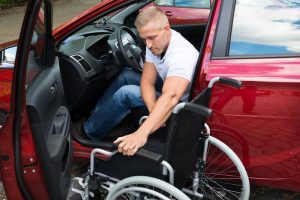Lakewood Car Accident Paralysis Lawyer
Spinal cord injuries are just one example of the type of catastrophic injury caused by significant car accidents. The National Institute of Neurological Disorders and Stroke lists car accidents as one of the leading causes of spinal cord injuries in the United States. The violent impact of a collision can damage the spinal cord in multiple ways, causing significant swelling, broken vertebra, and even severing the spinal cord completely. These injuries can result in permanent paralysis, a condition with no cure and, often, limited treatment options.
If a car crash that wasn’t your fault has caused a paralyzing injury, medical bills and the loss of your ability to work may be jeopardizing your financial future. It may be challenging to think about the future when you are wrapped up in the sudden physical and emotional changes brought on by a paralysis diagnosis. For that reason alone, you need to get in touch with an experienced car accident attorney as soon as possible. The legal team at The Law Offices of Briggs & Briggs wants to help safeguard your future by pursuing the compensation you deserve while you focus on the recovery process.
The Lakewood car accident lawyers of The Law Offices of Briggs & Briggs have extensive experience working with Washington car accident victims. We understand you need additional emotional support and compassion, which we provide in addition to effective and aggressive legal counsel. To set up your free and confidential consultation, call our office at (253) 588-6696. We want to speak with you and find ways to help you recover the money you need.
What Is Paralysis?

The spinal cord is a thick bundle of nerves that run from the base of the brain down the entire length of the spine. The spinal cord transmits messages between the brain and the rest of the body. The cord itself is protected by bones called vertebrae. When the spinal cord is damaged, it can result in paralysis, or even death. Paralysis happens when damage to the spinal cord inhibits the brain and body from communicating. This loss of communication can result in loss of feeling, muscle control, and voluntary and involuntary movement.
There are two categories of paralysis:
Incomplete Injury – An incomplete spinal cord injury means that the spinal cord is damaged, but it is still able to transmit some messages between the brain to the body.
Complete Injury – A complete spinal cord injury happens when the spinal cord is damaged so extensively that it cannot transmit messages. There is no nerve communication between the body and the brain.
Patterns of Paralyzing Injuries
The pattern of injury caused by spinal cord damage depends on where on the spine the damage occurs. Most spinal cord injuries are identified by the region of the spine where the injury occurred:
- Cervical: Cervical vertebrae protect the spinal cord in the neck. The first two vertebrae are known as Atlas and Axis.
- Thoracic: The next twelve vertebrae in the spine are the thoracic vertebrae. These bones protect the spinal cord in the upper region of the back.
- Lumbar: Lumbar vertebrae protect the spinal cord in the lower back.
- Sacral: The sacral vertebrae are fused and known collectively as the tailbone.
Spinal cord injuries are also identified by which area of the body the damage impacts. Generalized paralysis typically impacts large regions of the body and can include:
- Hemiplegia: Paralysis that occurs on one side of the body.
- Diplegia: Losing the ability to feel or control the same area on both sides of the body.
- Monoplegia: Losing the ability to move or control one limb.
- Paraplegia: Losing the ability to move, control, or feel both legs. Paraplegia can also impact sections of the torso. Injuries to the lumbar and sacral regions of the spine can cause paraplegia.
- Quadriplegia: Paralysis that impacts all limbs. Injuries in the cervical and thoracic region of the spine can result in quadriplegia. Quadriplegics can lose the ability to control the arms, legs, and torso and generally have little to no feeling below the neck or chest.
Paralysis doesn’t just impact the muscles we consciously control. It can impact muscle movements we never have to think about, including regulating our breathing and maintaining body temperature.
Signs of a Spinal Cord Injury

After a significant car accident, you may be in a state of shock. Adrenaline may be coursing through your veins, and you have no time to stop and think about the extent of your injuries. While some spinal cord injuries are immediately apparent, others can take time to develop. You may feel the pain of broken vertebrae but not have classic symptoms of a spinal cord injury. However, even minor movements can cause sharp bone fragments to severe your spinal cord and result in a permanent injury.
If you are involved in a car accident, get medical help immediately and reach out to The Law Offices of Briggs & Briggs. Potential signs of a spinal cord injury can include:
- Pain
- Numbness
- Tingling
- Loss of movement
- Loss of bowel or bladder control
- Loss of feeling or sensation
- Muscle cramps or spasms
Compensation for Paralysis
Did a negligent driver cause the accident? Then you may be able to recover compensation for your injuries. A paralyzing injury can impact you for the rest of your life. You may be unable to return to work or care for yourself in some respects. Without an income, how will you cover the medical expenses related to your injury? According to the Christopher & Dana Reeve Foundation, the first year of medical costs associated with a paraplegia diagnosis can reach $518,904. Medical costs associated with a quadriplegia diagnosis can reach $1,064,716. Those are only the medical costs related to the first year of treatment. Estimated lifetime costs can reach millions of dollars.
While the value of a claim will depend on the severity of a victim’s injuries and who caused the crash, in many cases, victims can seek financial compensation for the following:
- Current medical expenses
- Future medical expenses
- Lost income
- Loss of earning capacity
- Property damage
- Emotional distress
- Loss of quality of life
- Pain and suffering
For an idea of what your car accident claim may be worth, contact a skilled Washington car accident attorney.
Contact Our Team Today
Hold negligent drivers accountable for their actions. Get in touch with a skilled car accident attorney today. At The Law Offices of Briggs & Briggs, we want to make sure that you have the chance to recover meaningful compensation for your paralyzing injury.
Talk to our compassionate team today about your case. Call (253) 588-6696, or contact us online to set up a confidential legal consultation. Meanwhile, take a look at some of our firm’s reviews.
